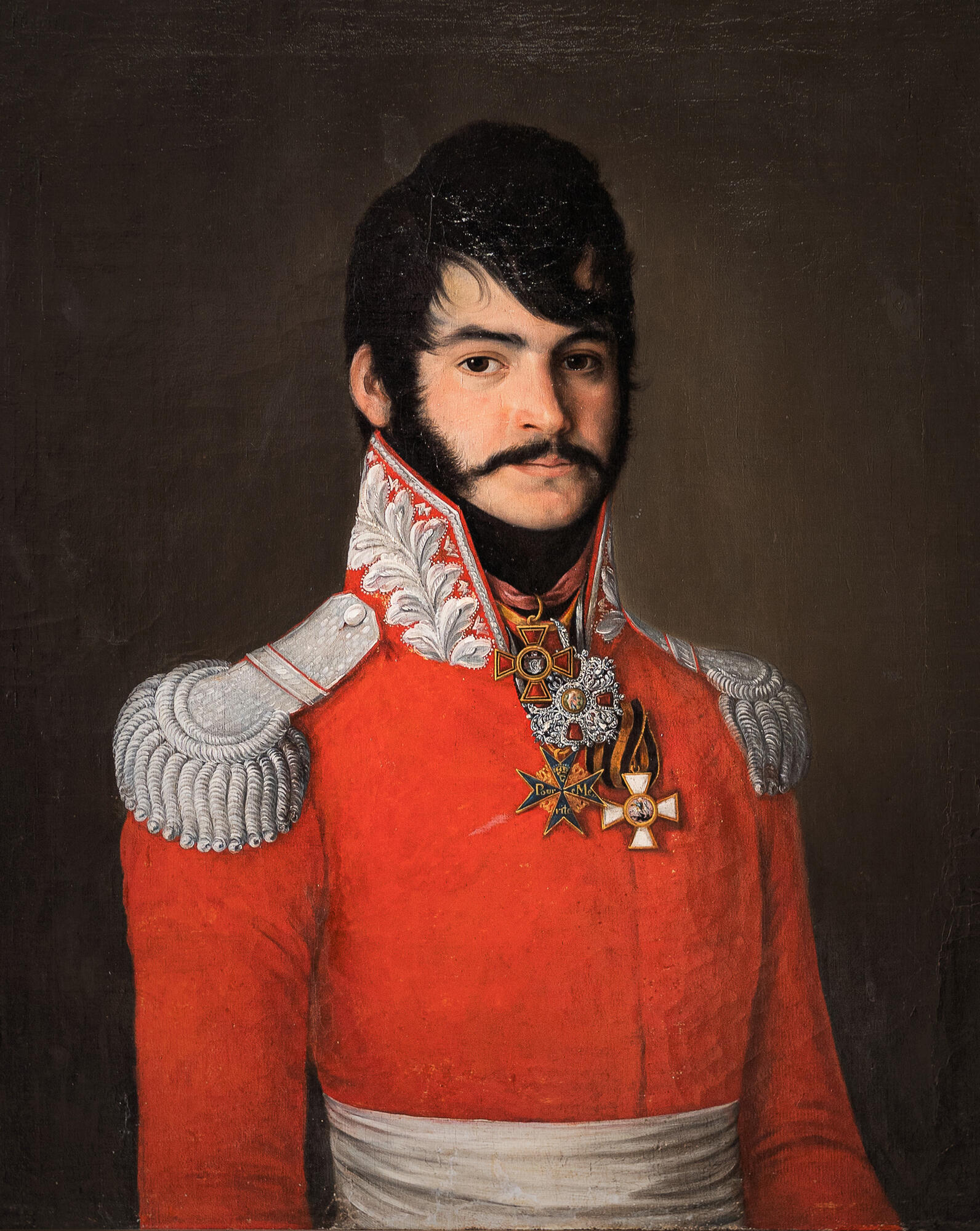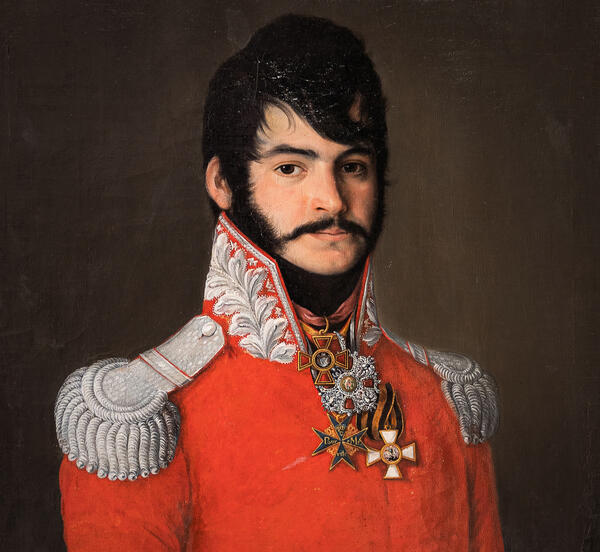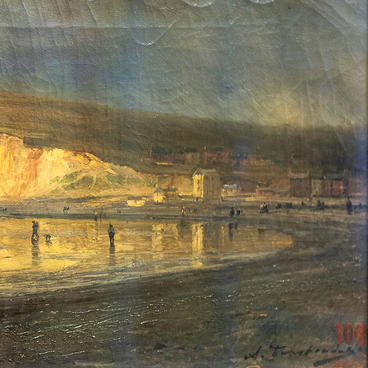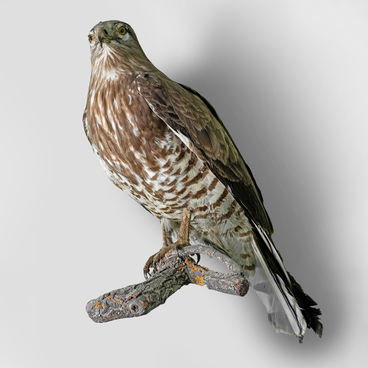The portrait created by an unknown artist depicts Count Vasily Orlov-Denisov who was the commander of the Leib-Garde Cossack Regiment during the Napoleonic Wars and the founder of the Russian noble family Orlov-Denisov. The count is depicted in a red Leib-Garde Cossack general’s uniform with a white belt and numerous awards.
Vasily Orlov was born on September 8, 1775. His father was the ataman of the Don Cossacks Vasily Petrovich Orlov, general of the cavalry, leader of the Indian campaign of Emperor Pavel I, and his mother was Daria Denisova, daughter of the Don Cossack Count Fyodor Denisov. Since the count had no direct male heirs and died in 1801, Vasily received the title and the right to a double surname of Orlov-Denisov.
In 1787, Vasily was enrolled in the Don Cossack regiment. He began his military service as a simple Cossack and soon received the rank of a Cossack sotnyk, i.e. a commander of a unit numbering more than 100 people. For two years, he had been stationed on the eastern coast of the Black Sea protecting it from the Turks.
In 1791, Orlov was transferred to a Cossack regiment stationed in St. Petersburg, where he met Gavriil Derzhavin (a well-known Russian poet). He helped the Cossack get the primary education, learn French and German. In July 1799, Orlov was promoted to colonel.
In 1807, Orlov-Denisov took part in military operations for the first time. During the War of the Fourth Coalition (Russian-Prussian-French War of 1806–1807), he fought the French at Gutshtadt and Heilsberg and defended the crossing of Allais River. For his distinction in battle, he was awarded the rank of Major General, and a year later, as the commander of the Leib-Garde Cossack Regiment, he took part in the Russian-Swedish War.
In 1811, Orlov-Denisov was awarded the rank of Adjutant General. During the 1812 Patriotic War, he commanded a Guards Cavalry Division, participated in rearguard battles and was wounded. At Vitebsk, he defeated three French cavalry regiments. In the battle of Borodino, during a cavalry raid, he led the first attack of three cavalry regiments on the enemy infantry.
During the Foreign campaigns of the Russian army in 1813–1814, Orlov-Denisov commanded the personal escort of Emperor Alexander I and was with him during the battles. In 1826, he was promoted to general of the cavalry retiring a year later.
However, he returned to active service during the Russian-Turkish war of 1828–1829. On March 23, 1828, during the reign of Emperor Nicholas I, Orlov-Denisov was the first to be awarded the title of general personally serving His Majesty.
Orlov spent the last years of his life in the Merchik estate near Kharkiv, where he founded the first-ever orphanage in the Russian Empire at his own expense. Orlov-Denisov died in 1843 and was buried in the Holy Cross Church of the Intercession Monastery in Kharkiv. In 1911, his ashes were transferred to Novocherkassk to the tomb of the Ascension Military Cathedral.
Vasily Orlov was born on September 8, 1775. His father was the ataman of the Don Cossacks Vasily Petrovich Orlov, general of the cavalry, leader of the Indian campaign of Emperor Pavel I, and his mother was Daria Denisova, daughter of the Don Cossack Count Fyodor Denisov. Since the count had no direct male heirs and died in 1801, Vasily received the title and the right to a double surname of Orlov-Denisov.
In 1787, Vasily was enrolled in the Don Cossack regiment. He began his military service as a simple Cossack and soon received the rank of a Cossack sotnyk, i.e. a commander of a unit numbering more than 100 people. For two years, he had been stationed on the eastern coast of the Black Sea protecting it from the Turks.
In 1791, Orlov was transferred to a Cossack regiment stationed in St. Petersburg, where he met Gavriil Derzhavin (a well-known Russian poet). He helped the Cossack get the primary education, learn French and German. In July 1799, Orlov was promoted to colonel.
In 1807, Orlov-Denisov took part in military operations for the first time. During the War of the Fourth Coalition (Russian-Prussian-French War of 1806–1807), he fought the French at Gutshtadt and Heilsberg and defended the crossing of Allais River. For his distinction in battle, he was awarded the rank of Major General, and a year later, as the commander of the Leib-Garde Cossack Regiment, he took part in the Russian-Swedish War.
In 1811, Orlov-Denisov was awarded the rank of Adjutant General. During the 1812 Patriotic War, he commanded a Guards Cavalry Division, participated in rearguard battles and was wounded. At Vitebsk, he defeated three French cavalry regiments. In the battle of Borodino, during a cavalry raid, he led the first attack of three cavalry regiments on the enemy infantry.
During the Foreign campaigns of the Russian army in 1813–1814, Orlov-Denisov commanded the personal escort of Emperor Alexander I and was with him during the battles. In 1826, he was promoted to general of the cavalry retiring a year later.
However, he returned to active service during the Russian-Turkish war of 1828–1829. On March 23, 1828, during the reign of Emperor Nicholas I, Orlov-Denisov was the first to be awarded the title of general personally serving His Majesty.
Orlov spent the last years of his life in the Merchik estate near Kharkiv, where he founded the first-ever orphanage in the Russian Empire at his own expense. Orlov-Denisov died in 1843 and was buried in the Holy Cross Church of the Intercession Monastery in Kharkiv. In 1911, his ashes were transferred to Novocherkassk to the tomb of the Ascension Military Cathedral.



